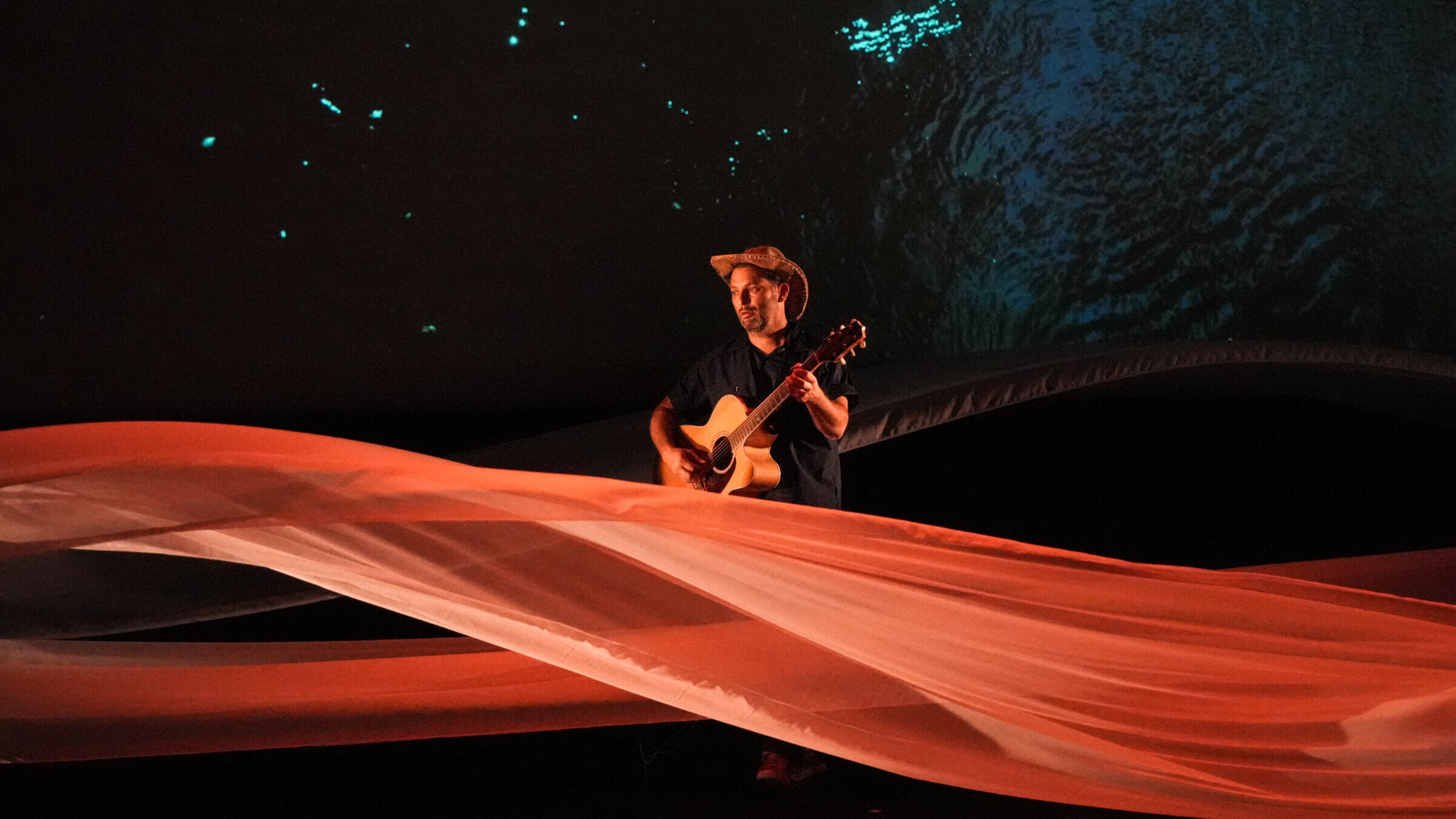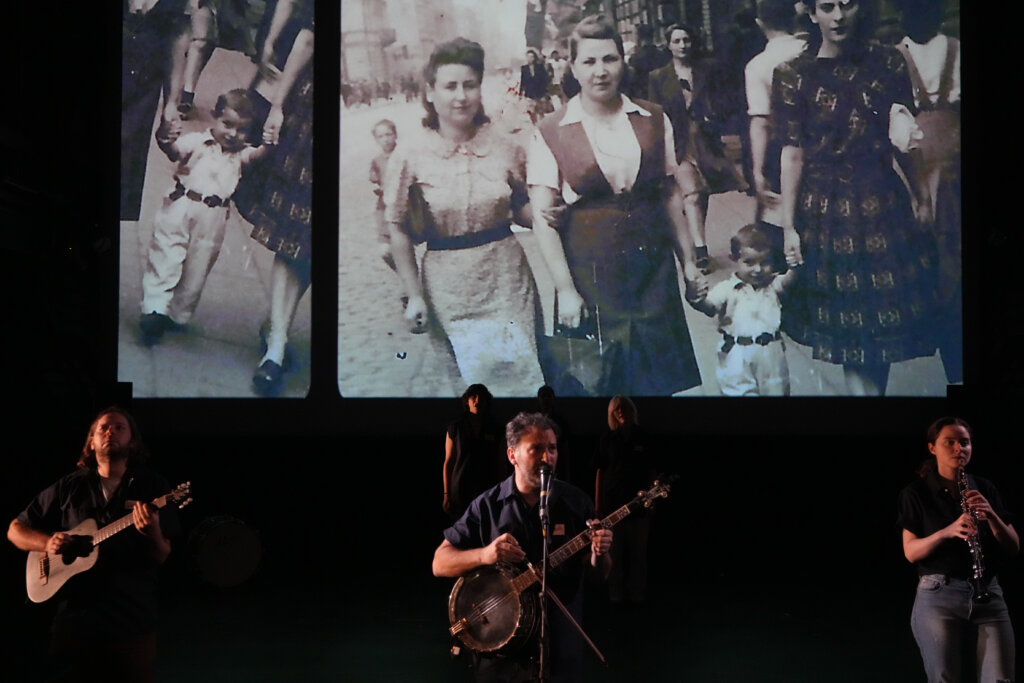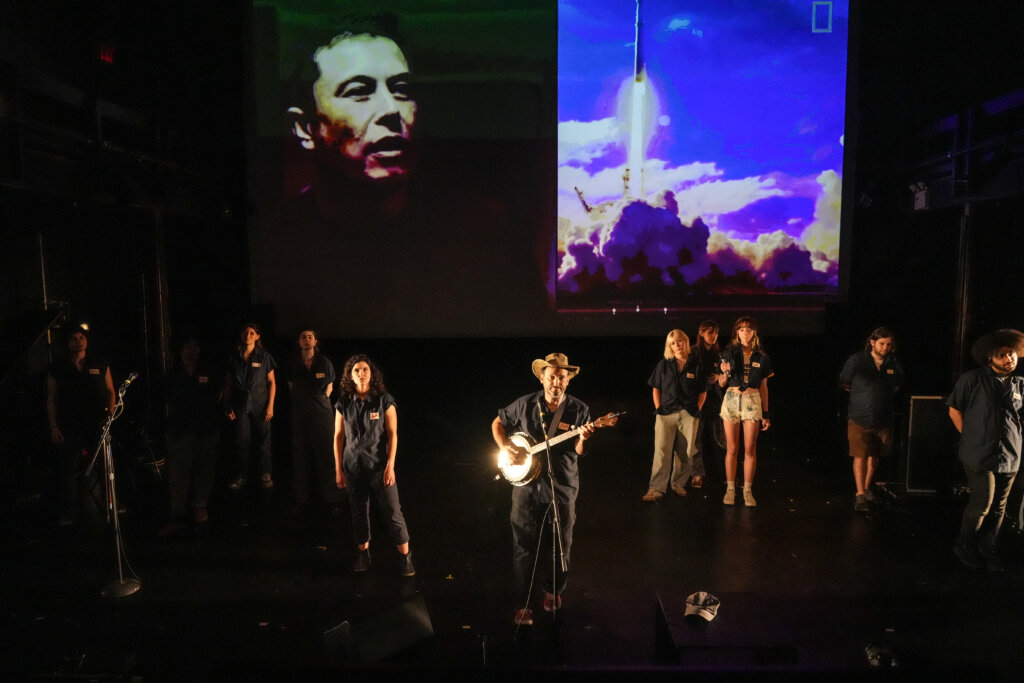His family survived the Holocaust. He survived long COVID. It’s Josh Fox’s ‘survivor’s obligation’ to fight the oil industry
In ‘The Edge of Nature,’ the Oscar nominee uses folk song to warn us about climate change

Josh Fox performs in The Edge of Nature. Photo by Steven Pisano
The director Josh Fox, in the face of global pandemic, the disease of political extremism and an impending ecological omnicide, suggests you dig your own grave and lie in it.
If this sounds like admitting defeat, it’s quite the opposite.
“It felt like coming home,” said Fox, who directed the Oscar-nominated documentary Gasland and the new film and theatrical experience The Edge of Nature, about his recovery from long COVID-19, climate change and “being the son and grandson of Holocaust survivors in the land of genocide.”
The new project, now playing at La MaMa, begins with footage of Fox breaking up rocks in a plot of land by his cabin in rural Pennsylvania, where he channeled Thoreau, living alone during a long convalescence in 2020 with only deer and beavers for company. While the movie plays, Fox and an ensemble, dressed in name-tagged mechanic shirts — a nod to Rage Against the Machine guitarist Tom Morello and to the workers’ spirit of the stage — sing the spiritual “Keep Your Hand on the Plow.” Fox mirrors his own, pre-filmed actions, swinging a banjo at a grave-shaped rectangle of light.
Fox’s self-burial, performed after a long isolation, stands in for a recommitment to the Earth that he says the fossil fuel industry is working to destroy. It’s also, as the film and performance illustrate, a rebuttal to European colonialism, which changed the landscape of North America and separated humanity from nature. He credits his earth bath with his recovery.

Fox, 51, is a longtime theater-maker who, after receiving a six-figure offer to sell his family’s land for fracking, made Gasland and transitioned to a role as a public activist. Speaking over Zoom from his home in Brooklyn, he drew a clear path from his family history of intergenerational trauma to his concern for the planet.
“All of the work I’ve ever done in the environment is inspired by my survivor’s obligation,” said Fox. “My obligation is to warn people about the future and to say, ‘This is what’s on the horizon.’”
Fox’s grandparents and his father, Michael, then an infant, narrowly escaped death in Europe (Fox’s grandfather was the Yiddish poet Chaim Leib Fox). In The Edge of Nature, Fox tells parts of their story, linking it to the genocide of Native Americans in a conversation with the late Paiute activist and filmmaker Myron Dewey, to whom the film is dedicated.
The live performance and pre-taped film in the Edge of Nature, devised to counteract the loneliness of a solo film and encourage participation, is rooted in the Jewish socialist ethic — Fox’s father, who has a place in Milanville, Pennsylvania, first discovered the Delaware River Basin as a camper at Camp Hemshekh, founded by Bundist Holocaust survivors — and the folk tradition.
Fox first met Pete Seeger in his school classroom, and played with him shortly before the singer’s death in 2014, and uses much of his music, along with a score by Dougie Bowne, re-orchestrated for banjo, oboe, violin, piano and vocals. The goal, after so much time spent in a Walden-like setup, was to be in the room and to energize an audience to action.
Though Gasland and Fox’s other films, How to Let Go of the World and Awake: A Dream From Standing Rock had long lives on HBO and Netflix, he said that finding a distributor for a climate documentary is now next to impossible. Instead, he wants to tour the piece around the Northeast — play in barns, Unitarian churches and backyards as well as traditional theaters.
Even given the weighty topics of genocide and ecocide, Fox’s piece is the opposite of a bummer, taking the time to remind people of how blue the sky was — and how clear the birdcalls were — when COVID-19 stopped the world and reduced emissions. It suggests that we not only must change course on climate, but that such a change is possible.
After touring previous films in what he estimates is around 600 cities, Fox wants to invite more discussion with post-show Q&As with activist groups at each show. After alerting the world to fracking almost 15 years ago, he believes he can move the needle in the crucial state of Pennsylvania come November’s election.
He has another suggestion, beyond self-interment, for how to counter the ills of the world.

In a preview performance, an audience member asked what to do about the links between the fossil fuel industry and global militarism.
“Number one, do the thing that you love,” Fox said — in his case, making art. Number two: vote, protest and go to the streets. In other words, “the thing that makes you just the same as everybody else.”
We’re all made of the same earth, Fox insists, and sometimes you need to till the soil.
Josh Fox’s The Edge of Nature is playing through June 30 at La MaMa.
Correction: A previous version of this article misstated Mr. Fox’s age. He is 51.





















